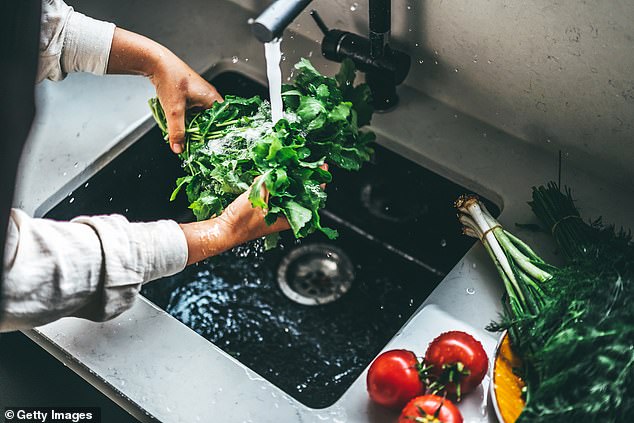[ad_1]
Bagged salad has become a staple in modern fridges. But are these ready-prepared leaves any good nutrition-wise – and what about the food poisoning risks? The potential harms were highlighted last summer when more than 280 people were struck down by a virulent form of E.coli linked to contaminated lettuce grown in the UK. Here, experts offer their advice…
Does it count as five-a-day?
‘Bagged salads are an easy way to get one of your five-a-day without the faff of washing and chopping,’ says nutritionist Rob Hobson, author of Unprocess Your Family Life.
But you need enough: many people assume that a handful of leaves counts as a portion, but for this you need 80g – which is roughly a cereal bowl full (and just over half a standard 140g bag), adds Clare Thornton-Wood, a dietitian based in Guildford.
And not all salad leaves are created equal.
‘Generally speaking, the darker the leaf, the richer it is in vitamins and minerals, although all contain a good amount of fibre,’ says Clare.
Kale wins for nutrient density, with twice the vitamin C (important for immunity) and vitamin K (for blood and bones) as broccoli per portion.
Spinach also scores highly, and is especially rich in vitamins A, C, K, folate (for energy) and potassium and magnesium – vital for hydration and bone health, respectively.
Two good handfuls of raw baby spinach – the type most commonly used in bagged salads – also provides 300mcg of vitamin K, more than double your recommended daily amount.

In the UK, bagged salad is typically washed in water containing dilute chlorine, which helps kill off bugs that can cause food poisoning, but outbreaks can still happen
Rocket and watercress are great sources of magnesium, plus vitamins A, C and folate.
As you might expect, iceberg lettuce, at 96 per cent water, is the least nutritious salad green, but is not without its benefits – as ‘eating hydrating fruit and veg such as lettuce can help increase your fluid intake, which is especially useful to prevent dehydration in hot weather’, explains Rob Hobson.
‘On the downside, chopping and bagging leaves will destroy some of their B vitamins and vitamin C content, especially once the bag is opened, through oxidation which occurs when nutrients are exposed to air.
‘And while convenient, bagged salads can be a more expensive way to eat lettuce and other salad leaves compared to buying them whole.’
For example, a 140g bag of M&S Italian Baby Leaf Salad costs £2.30, compared with just 90p for a 550g M&S whole iceberg lettuce.
What about food poisoning?
In the UK, bagged salad is typically washed in water containing dilute chlorine, which helps kill off bugs that can cause food poisoning.
But while food poisoning outbreaks from bagged salads in the UK are rare, they do happen – as leaves can become contaminated at every step of the production process, such as contact with bacteria in the soil or water, on the picker’s hands or from equipment.
A 2022 report in the International Journal of Environmental Research and Public Health found that salmonella and other bacteria were still ‘a significant problem’ in some ready-to-eat salads.

Clare Thornton-Wood, a dietitian, says that ‘generally speaking, the darker the leaf, the richer it is in vitamins and minerals, although all contain a good amount of fibre’
Salmonella is particularly adept at gripping on to salad leaves using their flagella – tiny propeller-like arms – making them difficult to wash off, according to a study by Imperial College London in 2008.
Even pre-washed spinach retained 90 per cent of its bacteria, raising the risk of food poisoning if consumed without further washing, reported researchers at the University of California in 2015. It seems the moist environment of bagged salad, coupled with nutrients seeping out of chopped leaves, create an ideal breeding ground for bacteria.
So should you give pre-washed leaves an extra wash? Expert opinion differs.
In 2008, the UK Food Standards Agency changed its advice – having previously said washing was necessary, it now says that washing pre-washed salad again adds no benefit.
Yet the NHS recommends washing all pre-washed salads and vegetables before use.
Slim Dinsdale, a microbiologist and food safety consultant based in Norwich, also urges caution: ‘Rarely, prepared salads can become contaminated with food-poisoning bacteria during the production process, which can quickly multiply inside the sealed bag due to the warmth. This is why there have been some cases of salads making people very sick regardless of the use-by date.’
His advice? ‘It’s sensible to wash pre-washed leaves thoroughly at home.’
Clare Thornton-Wood agrees: ‘Even if the packet says washed and ready-to-eat, I’d always give it an extra rinse.
‘Studies show that bacteria on just one leaf can quickly spread to the whole packet.’ (She doesn’t buy bagged salad, but grows her own.)
For a thorough clean, place leaves in a bowl of still water, letting them soak for five minutes, then rinse in a colander under cold running water for another two minutes to remove any remaining soil or microbes, she says.
[ad_2]
This article was originally published by a www.dailymail.co.uk . Read the Original article here. .

